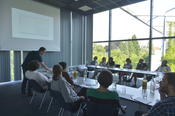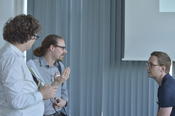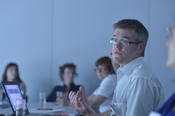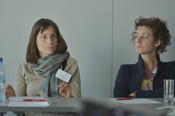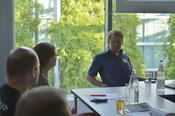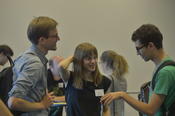New Media and Research
On July 15, 2014, Junges Wissenschaftsforum Dahlem invited three experts from Berlin-based research institutions who study the influence of digital media on academic research: Dr. Sascha Friesike from the Alexander von Humboldt Institute for Internet and Society, Henning Krause from the Berlin office of the Helmholtz Association, and Dr. Niels Taubert from the Berlin-Brandenburg Academy of Sciences and Humanities. In two rounds of one hour-long workshops, the participants had the opportunity to ask questions, exchange ideas, and familiarize themselves with some of the ways that digital media are shaping the production and dissemination of knowledge. An additional workshop was offered by Dr. Christoph Raetzsch, who is a postdoc at Freie Universität’s Institute for Media and Communication Studies.
Each of the workshops illuminated both the breadth of this subject as well as the interconnected nature of its various facets. In his workshop on “Open Science: New Ways of Collaborating in Research,” Sascha Friesike gave an overview of concepts such as Open Data, Open Access, and Citizen Science, all of which promise to facilitate the participation in research endeavors and the sharing of research results. What motivates the use of these instruments is a wish not only for improved collaboration but also for faster ways of disseminating one’s own ideas.
In his workshop on “Research Communication 2.0,” Henning Krause introduced different methods of fashioning one’s research profile on the web in general and on social media in particular. Via blogs, downloadable papers, and even YouTube, researchers can influence the reception of their publications and ensure that these reach their intended audiences. The participants in this workshop were particularly interested in determining the right moment for presenting their research to the public, a question whose answer depends as much on one’s confidence as it does on the use of the particular medium involved.
Publication strategies were also the topic of Niels Taubert’s workshop on “The Future of Academic Publishing,” though in this case the focus lay on journals and publishing houses. Taubert presented the results of a survey that his research group had conducted in the German academic community, with special points of interest being issues such as electronic publication vs. print publication, blind peer review vs. non-blind peer review, and questions of authorship in general.
Christoph Raetzsch’s workshop on “Initiating International Collaborations Through Social Media” discussed ways of using online platforms such as mendeley.com or academia.edu for finding new partners for international research projects. His workshop focused especially on the best ways of identifying which of the many available instruments would be most useful for a particular project.
One thing that the different workshops demonstrated is that many of these trends and developments are still only beginning to take shape. It will be interesting, therefore, to see which instruments will be taken up by the research community in what ways—a process that the workshops gave a first indication of. At the subsequent barbecue in the courtyard of the Seminaris Conference Center, this was one among many questions that kept the participants talking until late in the evening.

